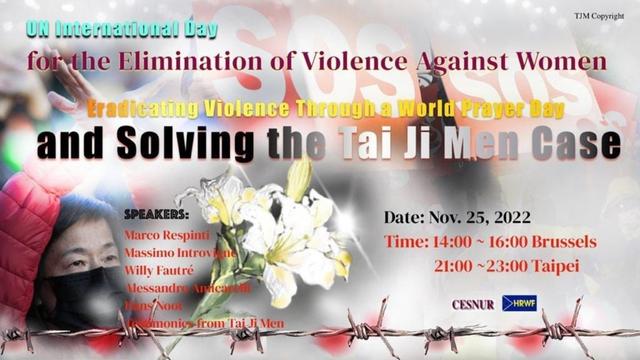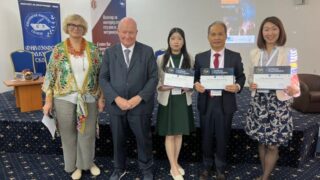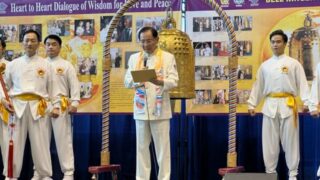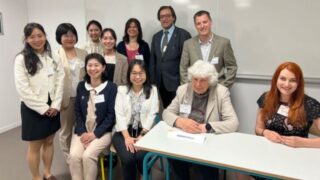On the International Day for the Elimination of Violence Against Women, scholars and activists endorsed the proposal of a world day for prayer as an antidote to all violence.
by Daniela Bovolenta


In 2022, November 25 has been celebrated throughout the world, perhaps more than in past years, as the United Nations International Day for the Elimination of Violence Against Women. This is a sign in itself that violence against women is perceived as a growing and serious problem. CESNUR, the Center for Studies on New Religions, and Human Rights Without Frontiers organized on November 25, 2022, one of their bi-monthly webinars discussing the Tai Ji Men case, with a special focus. The proposal by Dr. Hong Tao-Tze, the Shifu (Grand Master) of Tai Ji Men, to institute October 16 as a World Prayer Day, was presented as an antidote to all kinds of violence.
Marco Respinti, an Italian scholar and journalist who serves as director-in-charge of Bitter Winter, introduced the webinar by stating that in the European Middle Ages, contrary to what many think, women had achieved respect and even prominence in the religious, political, and cultural life. If anything, it was with the advent of modernity that this prominence was denied to them, which sometimes resulted in the glorification of a male attitude regarding women as mere sexual objects.
Respinti used examples from the dystopic Mad Max movies to show how this attitude naturally leads to violence. Respinti also referred to a 18th century book by Alphonsus Liguori, an Italian Catholic bishop, called “Prayer: The Great Means of Salvation,” to emphasize that prayer is a human need and a key for a harmonious society, not only for Catholics and not only for religious believers but for everybody.
Respinti presented a video showing violence perpetrated against women who protested in Taiwan on behalf of Tai Ji Men, including the incident of September 19, 2020, when Ms. Huang, a volunteer for the Legal and Tax Reform League and a Tai Ji Men dizi (disciple), was taken to a police station and mistreated by officers.


Respinti then introduced the first two speakers, Massimo Introvigne, an Italian sociologist who serves as managing director of CESNUR and editor-in-chief of Bitter Winter, and Willy Fautré, co-founder and director of Human Rights Without Frontiers.
Introvigne explained why the webinar, on International Day for the Elimination of Violence Against Women, presents and promotes the proposal of the World Prayer Day. Introvigne noted that a World Day of Prayer, created by Christian women in the 19th century, is still celebrated and now open to non-Christians too, but its confessional origins have prevented secular international institutions from endorsing it. He then discussed a 17th-century painting by the Dutch artist Rembrandt, representing the Greek philosopher Aristotle contemplating a bust of the Greek poet Homer.
In the painting, Aristotle is wearing a large and very visible golden chain. Its meaning was immediately understandable to cultivated 17th-century Europeans, at a time when they all had read Homer’s poem “Iliad.” There, in a speech by the Supreme God Zeus, a golden chain with one end in heaven and one on earth is discussed. Generations of philosophers, up to Rembrandt’s time, Introvigne commented, had seen in the golden chain a representation of the unity of all things in the universe.
Christians had interpreted holding the golden chain as getting attuned to this universal unity, i.e., praying. This prayer is non-sectarian and not necessarily religious, Introvigne said, because even those who do not believe in God may recognize the intimate unity of the universe and find in it a comfort and a warning against any violence. For this reason, the World Prayer Day is a “proposal to hold the golden chain” that all can support, independently of their religious beliefs or lack thereof, Introvigne concluded.


Fautré discussed three themes connected with the International Day for the Elimination of Violence Against Women: domestic violence in the European Union; sexual abuse of power, violence, and rape by politicians; and sexual violence and rape in war time. Fautré reported that survey data show that in the European Union one woman in three has experienced some form of physical and/or sexual violence since the age of 15, and one in 20 has been raped. Over one in five women has experienced physical and/or sexual violence from either a current or previous partner. Unfortunately, even high-placed politicians have been convicted for being among the perpetrators.
Violence and rape of women increase in times of war, Fautré said. There are not yet complete statistics about sexual abuse of women by Russian troops in Ukraine, but the first data indicate it is occurring on a massive scale. Fautré concluded by noting that Dr Hong’s teachings about the relations between men and women are based on equality, mutual respect, mutual trust and fidelity, transparency, responsibility, and non-violent settlements of domestic conflicts. These teachings deserve to be studied throughout the world, Fautré insisted.
Alessandro Amicarelli, a London-based human rights attorney who serves as president of the European Federation for Freedom of Belief (FOB) introduced the second part of the webinar, where five Tai Ji Men dizi shared their experiences. Amicarelli emphasized that the struggle against violence starts inside us rather than outside. It is a fundamental teaching of Dr. Hong, Amicarelli said, and one that the World Prayer Day may further promote.


May Mei, a housewife, recalled how the International Day for the Elimination of Violence Against Women was instituted on November 25 to remember the assassination on that date in 1960 of the three Mirabal sisters, who were protesting against the authoritarian regime then ruling the Dominican Republic. Violence, Mei said, has many facets, including corruption and lies by corrupt tax officers to prey on taxpayers, a widespread phenomenon in Taiwan of which the Tai Ji Men case is just one example.
Violence can only be effectively fought by an appeal to conscience, she said. She recalled how in 2001 she went with Dr. Hong for the 8th World Cup International Martial Arts Championships to Japan, where six members of the local Parliament, the Diet, rang the Bell of World Peace and Love and were thus energized in their action for peace. Today, support for the Declaration of World Prayer Day would also give strength to those who fight for peace, Mei concluded.
Amicarelli then shared a video, “Children of Heaven,” which opened and concluded with a song from the indigenous Atayal (also called Taiya) tribe in Taiwan. Young boys and girls presented an ancient fairy tale about overcoming the “five poisons” of greed, hate, ignorance, arrogance, and doubt. Because they let the five poisons contaminate them, the children of Heaven had to descend to Earth.
They were told by God that by living wisely they would be able to return to Heaven. They forget God’s advice, though, and the five poisons wreaked havoc on Earth through wars and epidemics. God called people to go back to their conscience, which eventually saved the Earth and allowed the children of Heaven to return home.


Eva (Yiling) Mao, who works as a commercial executive assistant, recalled her visit with Dr. Hong in 2017 to Russia, Estonia, Latvia, Lithuania, and Poland to promote the Movement of an Era of Conscience. From her visit to Russia, she said, she derived the impression that most Russians love peace and “no one wants to live in violence,” the recent events notwithstanding.
Mao also recalled her visit with Dr. Hong and performance in Bahrain in 2018, when the Bahraini city of Muharraq had been proclaimed the Capital of Islamic Culture; it was another opportunity to promote international love and peace, Mao said. She hopes the message endorsing peace and repudiating injustice would go through, and help solving the Tai Ji Men case as well.
Eloy (Sing-Ho) Ye, an international sales representative, started by commenting on the phenomenon of “mafia girlfriends” in Sinaloa, Mexico, where girls fight between each other to become the girlfriend of a drug dealer, and some die in the process.
To contrast this abuse of women within a context of illegality, Ye proposed the powerful statements about the rule of law he recently heard by attending with Dr. Hong the 23rd International Conference of Chief Justices of the World in Lucknow, India. Some participants, including the President of the Latin American Federation of Judges (FLAM), Adriana Orocú from Costa Rica, discussed with the dizi the Tai Ji Men case and expressed their sympathy. They also underlined the global importance of the case, Ye said.
Ariel (Ke-Jun) Cian, a system analyst, compared the case of Ms. Huang, who was abused by police during a Tai Ji Men protest, with other instances of police brutality in Taiwan. This is part, Cian said, of a context of disrespect for the rule of law in Taiwan, which also includes the illegal actions of corrupt tax bureaucrats in the Tai Ji Men case. She expressed the hope that the Global Prayers for Love and Peace of October 16 and the institution of the World Prayer Day will be a call to conscience in Taiwan and elsewhere, and may also help promote the solution of the Tai Ji Men case.
Winnie Lo, a government employee, shared her experience of traveling with Dr. Hong to Rio de Janeiro, Brazil, for the 2012 United Nations Conference for Sustainable Development (Rio+20). She was particularly impressed by Costa Rican President Laura Chinchilla Miranda, who rang Tai Ji Men’s Bell of World Peace and Love, and her words about peace and how sixty years ago Costa Rica had decided to abolish its army. By attending international peace events, Lo also understood the deep connection between peace, conscience, justice, and the eradication of all forms of violence, she said, including war, abuse against women, and the inherently violent repression of Tai Ji Men’s rights in Taiwan.
Hans Noot, the president of the Dutch Gerard Noodt Foundation for Freedom of Religion or Belief (GNF), named after the Dutch legal scholar and champion of religious liberty Gerard Noodt, offered the conclusions of the webinar. He noted the present emphasis on sexual abuse of women, which he said is only a part of broader abuse and discrimination perpetrated against women. In situations of conflict and war, these abuses become even worse. Even in democratic countries such as the United States, gender inequality is not decreasing, Noot said.
Child marriage is a plague in many countries, and that domestic violence against women is a dramatic problem in China has been revealed by some recent incidents, Noot emphasized, adding that international institutions try to fight violence and discrimination against women, but much remains to be done. He also expressed his solidarity to female dizi who are in different ways victims of violence connected with the Tai Ji Men case, and his support for the Declaration of World Prayer Day.


The event concluded with a video about Dr. Hong’s and his dizi’s recent trip to India from November 15 to 22, to visit Delhi and attend in Lucknow the 23rd International Conference of Global Chief Justices. Dizi offered there a powerful testimony for peace, love, and conscience, supported by several international authorities, and promoted the Declaration of World Prayer Day.









